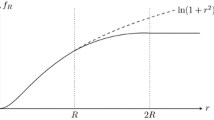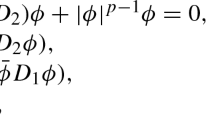Abstract
In this paper, we prove that the Faddeev energy E 1 at the unit Hopf charge is attainable. The proof is based on utilizing an important inequality called the substantial inequality in our previous paper which describes how the Faddeev energy splits into its sublevels in terms of energy and topology when compactness fails. With the help of an optimal Sobolev estimate of the Faddeev energy lower bound and an upper bound of E 1, we show that E 1 is attainable. For the two-dimensional Skyrme model, we prove that the substantial inequality is also valid, which allows us to greatly improve the range of the coupling parameters for the existence of unit-charge solitons previously guaranteed in a smaller range of the coupling parameters by the validity of the concentration-compactness method.
Similar content being viewed by others
References
Aubin T. (1976) Problemes isoperimetriques et espaces de Sobolev. J. Diff. Geom. 11, 573–598
Battye R.A., Sutcliffe P.M. (1998) Knots as stable solutions in a three-dimensional classical field theory. Phys. Rev. Lett. 81, 4798–4801
Battye R.A., Sutcliffe P.M. (1999) Solitons, links and knots. Proc. Roy. Soc. A 455, 4305–4331
Cho Y.M. (2001) Monopoles and knots in Skyrme theory. Phys. Rev. Ltt. 87: 252001
Evans L.C.: Weak Convergence Methods for Nonlinear Partial Differential Equations. Regional Conference Series in Math. No. 74, Providence, RI: A. M. S., 1990
Faddeev L.: Einstein and several contemporary tendencies in the theory of elementary particles. In: Relativity, Quanta, and Cosmology, Vol. 1, edited by M. Pantaleo F. de Finis, Newyork: Johnson Reprint Co., 1979, pp. 247–266
Faddeev L.: Knotted solitons. In: Proc. Internat. Congress Mathematicians, Vol. I, Beijing: Higher Ed. Press, 2002, pp. 235–244
Faddeev L., Niemi A.J. (1997) Stable knot-like structures in classical field theory. Nature 387, 58–61
Jackiw R. (1977) Quantum meaning of classical field theory. Rev. Mod. Phys. 49, 681–706
Jackiw R.: Chern-Simons integral as a surface term. http://arxiv.org/list/math-ph/0408051, 2004
Kundu A., Rybakov P. (1982) Closed-vortex-type solitons with Hopf index. J. Phys. A Math. Gen. 15, 269–275
Lin F., Yang Y. (2004) Existence of energy minimizers as stable knotted solitons in the Faddeev model. Commun. Math. Phys. 249, 273–303
Lin F., Yang Y. (2004) Existence of two-dimensional Skyrmions via the concentration-compactness method. Comm. Pure Appl. Math. LVII: 1332–1351
Lions P.L.: The concentration-compactness principle in the calculus of variations. Part I. Ann. Inst. H. Poincar’e – Anal. non linéaire 1, 109–145 (1984); Part II, ibid 1, 223–283 (1984)
Manton N.S. (1987) Geometry of skyrmions. Commun. Math. Phys. 111, 469–478
Rosen G. (1971) Minimum value for c in the Sobolev inequality \(\|\phi^3\|\leq c\|\nabla\phi\|^{3*}\). SIAM J. Appl. Math. 21, 30–32
Shabanov S.V. (2002) On a low energy bound in a class of chiral field theories with solitons. J. Math. Phys. 43: 4127–4134
Skyrme T.H.R. (1961) A nonlinear field theory. Proc. Roy. Soc. A 260, 127–138
Skyrme T.H.R. (1961) Particle states of a quantized meson field. Proc. Roy. Soc. A 262, 237–245
Skyrme T.H.R. (1962) A unified field theory of mesons and baryons. Nucl. Phys. 31, 556–569
Skyrme T.H.R. (1988) The origins of Skyrmions. Internat. J. Mod. Phys. A 3, 2745–2751
Tartar L.: Compensated compactness and applications to partial differential equations. In: Nonlinear Analysis and Mechanics: Heriot-Watt Symposium, Vol. IV, edited by R.J. Knops, London: Pitman, 1979, pp. 136–212
Talenti G. (1976) Best constant in Sobolev inequality. Ann. Mat. Pura Appl. 110, 352–372
Vakulenko A.F., Kapitanski L.V. (1979) Stability of solitons in S 2 nonlinear σ-model. Sov. Phys. Dokl. 24, 433–434
Ward R.S. (1999) Hopf solitons on S 3 and R 3. Nonlinearity 12, 241–246
Whitehead J.H.C. (1947) An expression of Hopf’s invariant as an integral. Proc. Nat. Acad. Sci. 33, 117–123
Zahed I., Brown G.E. (1986) The Skyrme model. Phys. Rep. 142, 1–102
Author information
Authors and Affiliations
Corresponding author
Additional information
Communicated by H.-T. Yau
Rights and permissions
About this article
Cite this article
Lin, F., Yang, Y. Energy Splitting, Substantial Inequality, and Minimization for the Faddeev and Skyrme Models. Commun. Math. Phys. 269, 137–152 (2007). https://doi.org/10.1007/s00220-006-0123-0
Received:
Accepted:
Published:
Issue Date:
DOI: https://doi.org/10.1007/s00220-006-0123-0




